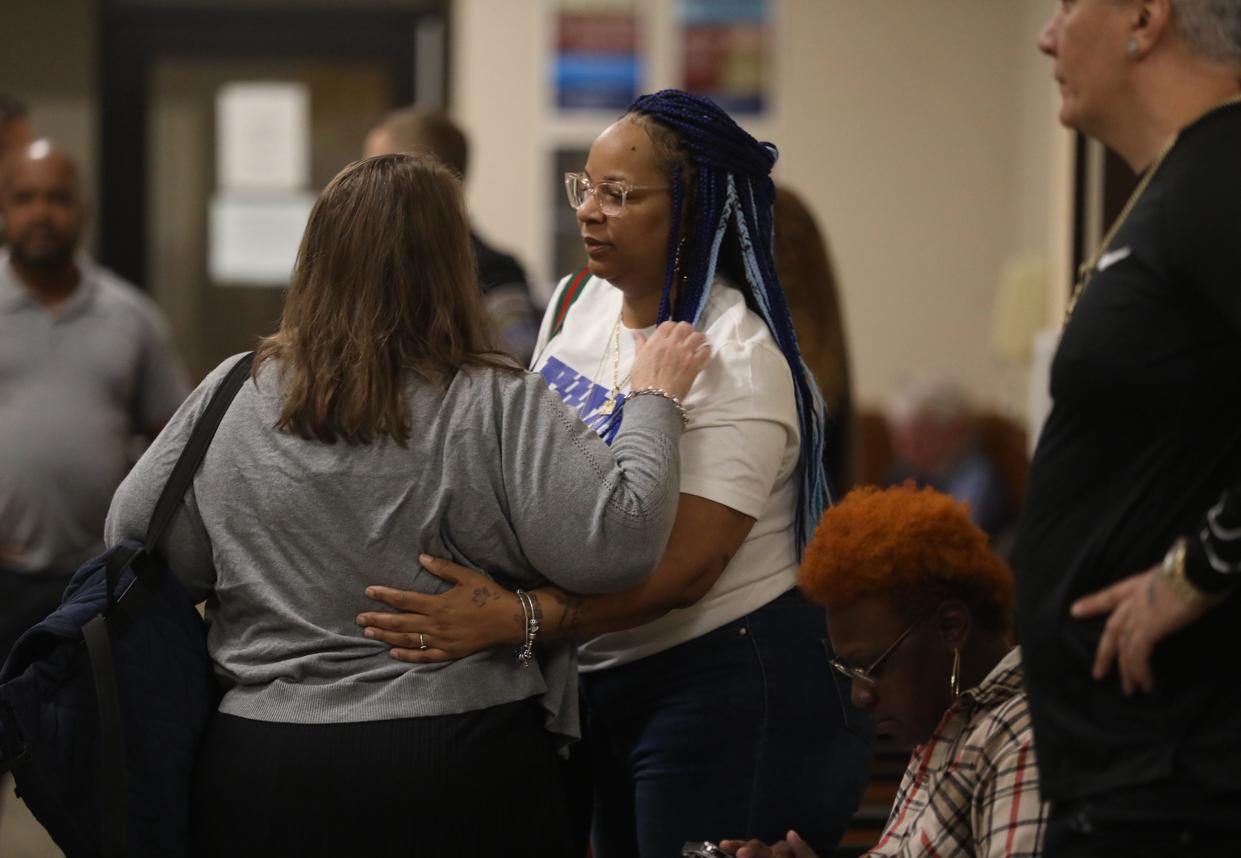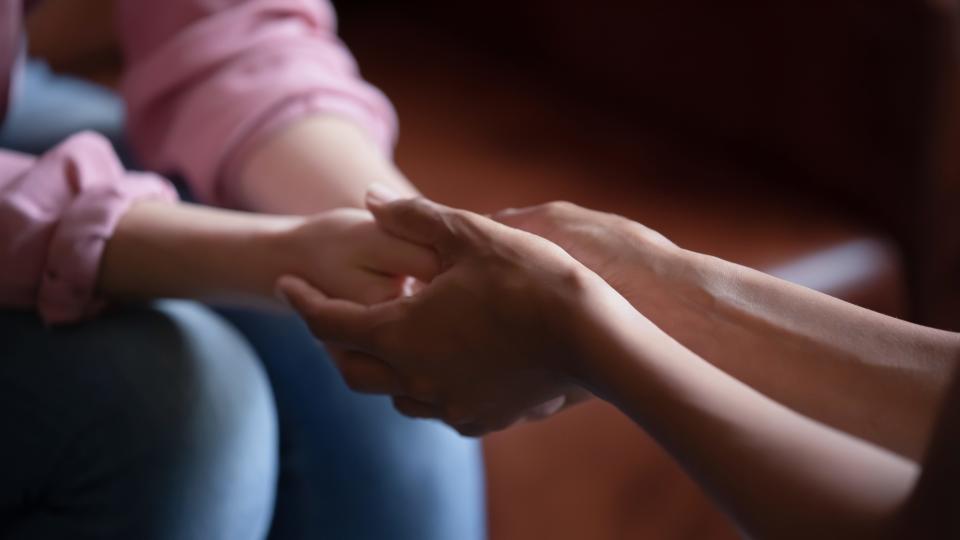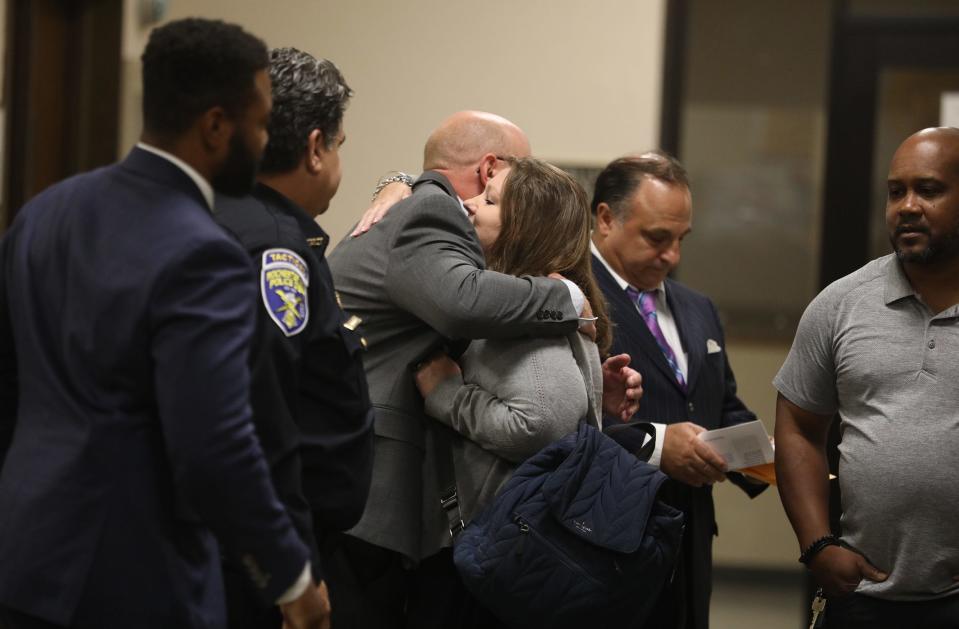These two Rochester women share a terrible tragedy. How does grief bonding connect them?

In court they sit side by side, sisters in grief.
There are moments when the testimony about death and violence pauses, and they chat with each other, sharing something that prompts a smile.
There are moments — too many of these — of sadness, when they each mourn what they have lost.
"We're bonding for life behind this whole ordeal," Lushone "Nikki" Siplin said of Lynn Mazurkiewicz. The two have been present each day for the trial of Kelvin Vickers Jr., accused of killing Siplin's son, Richard Collinge, and Mazurkiewicz's husband, Rochester Police Officer Anthony Mazurkiewicz.
The friendship began on the trial's first day, when Mazurkiewicz approached Siplin with both empathy and apology — empathy for their shared loss, apology for the heavier media focus on the homicide of a police officer.
"She literally just came up to me and gave me a hug," Siplin said.
Mazurkiewicz "felt bad" that the victims were not receiving the same attention, Siplin said, since each family was struggling with similar heartbreak, similar sorrow.
"It's still the same," Siplin said. "The loss has been tremendous on both of our sides."
Connected by a string of nights of violence and terrible news

The world at large speaks of "closure" and "justice," but those words are hollow for those who have lost loved ones to crime, she said.
This is what she understands.
This is what she believes Lynn Mazurkiewicz understands.
In a moment captured and reported on by Jackie Napier of WHAM-13, Rochester Locust Club police union President Mike Mazzeo last week gave Siplin a "guardian angel" pin blessed by a police chaplain. She has since worn it to court.
Siplin's son was fatally shot on North Clinton Avenue in the early morning hours of July 20, 2022, along with MyJel Rand. Siplin said her son was waiting for an Uber to go to a studio where he sometimes recorded rap music under the name Huncho2gz.
He was a skilled rapper. In a "Popout" performance on Youtube from March 2022, "Thunder and Rain," Collinge rapped in an orange balaclava, hoodie and puff jacket in a convenience store with a hanging mic.
In front of the "Cold Beverages" and two of his crew, Huncho2gz smoothly delivered lyrics about coping with the pressure of life, including: "Why do y'all wait til it's too late to love somebody / Can you love me while I'm still alive?”
Comments on YouTube were grateful and sad.
"LONG LIVE MY F---ING BROTHER 💙 💯 HUNCHO FOREVER"
"RIP…. This song will live in my head rent free. You was a funny guy. Gone way too soon."
He has other videos online. This one has racked up tens of thousands of views.
Attack on police? Shooting in Rochester NY ends with fatal gunfire
The trial started in September. Its initial days focused on a war between rival drug gangs that led to a gunfire battle on July 19, 2022, and the homicides of Collinge and MyJel Rand in the early morning hours of July 20.
Officer Mazurkiewicz was killed on July 21 during police response to the spree of violence.
His widow has asked the media not to interview her during the trial.
TRAGEDY IN PUBLIC: Isabelle Rosso, director of the Anxiety and Traumatic Stress Disorders Laboratory at McLean Hospital in Massachusetts, said it's important for journalists to respect the wishes when possible of the family of people lost to violence.
"Understand that these relatives are feeling a loss of control following the tragic event that happened in their personal life," she said of general situations similar to the Vickers trial. "On top of that, this very personal and devastating event is being covered in the media, which means that they also may not have control over what is portrayed to the public."
"We gotta stand with each other because we're all invovled," says Nikki Siplin, mother to the late Ricky Collinge. Nikki shared her profound experience of forging an unexpected bond with the Rochester Police Department and the Mazurkiewicz family in the aftermath of her son's… https://t.co/emSo6iHHiR pic.twitter.com/L4x7DSvPMF
— Jackie Napier (@TheJackieNapier) September 29, 2023
Grief can be a powerful force that brings survivors together
Parents can understand each other, often, through shared experiences. That factor is even more at play in this situation.
Nikki Siplin and Lynn Mazurkiewicz have been pulled together by trauma, spectators in a high-profile courtroom proceeding for Rochester.
Experts talk about the reasons this often happens.
Bill Hoy is a clinical professor of medical humanities at Baylor University. He’s widely regarded as an authority on the role of social support in death, dying and grief.
"The general public believes grief is something from which we recover like a bad bruise or a broken arm," Hoy said on Friday. "Death is more of an amputation. We don’t recover. We adapt."
He said this kind of grief is primarily a social process — more so than a neurological one; we seek comfort from people who are like us and share our stories. It's the reason why bereaved parent-led support groups are the only ones that work, Hoy said, not ones led by a counselor.

Sara Hodges is a professor and head of the psychology department at the University of Oregon.
"There is an expectation that people who are similar to us will understand us better," she said. "Similar experience gives you insight."
With gun violence, it may be hard for the general public — neighbors, friends — to comprehend the dynamics of grief for surviving parents, Hodges said. As humans, we're wired to assume that someone inside a connected tragedy might relate to us better, whether that is true or not.
Joanne Cacciatore is a professor of social work at Arizona State University. She studied what happened after the Sandy Hook elementary school mass shooting in December 2012. Also, she is involved in the Apple TV+ release of The Me You Can’t See, a mental-health documentary produced by Oprah Winfrey and Prince Harry.
Our American response to grieving survivors remains inadequate, she said. Cacciatore said there is new, strong guidance in the literature about how to help family members and other countries are adopting it, but the United States is not.
Above all, we should center the needs of the people who are primary to the tragedy, even if the wider network is grieving vicariously. "People in the extended community tend to center their own feelings" instead, Cacciatore said.
Difficult testimony in the Vickers trial in Rochester

In the trial's early days, Siplin and Lynn Mazurkiewicz were in court as there was testimony of the multiple gunshot wounds suffered by Collinge. He was pronounced dead at the scene.
A different day was weighted with testimony about the fatal shooting of Mazurkiewicz as he and Seng conducted the plainclothes surveillance on Bauman Street in an unmarked van.
Officer after officer told of the final minutes of Mazurkiewicz. Many in the court quietly wept, as did those testifying from the stand.
Sitting next to Lynn Mazurkiewicz, Siplin also cried.
"Tears were streaming down my face," Siplin said. "I felt her pain."
— Gary Craig is a veteran reporter with the Democrat and Chronicle, covering courts and crime and more. You can reach Craig at gcraig@rocheste.gannett.com. He is the author of two books, including "Seven Million: A Cop, a Priest, a Soldier for the IRA, and the Still-Unsolved Rochester Brink's Heist."
— William Ramsey contributed reporting for this article. He is an editor with the USA TODAY Network-New York, focusing on enterprise projects and climate journalism. Reach him at wramseyiii@gannett.com.
BACKGROUND:
Police and prosecutors say an ongoing turf war sparked several nights of violence, in which at least three other people, including Mazurkiewicz's partner, Sino Seng, were wounded by gunfire.
When ambushed on July 21, Mazurkiewicz and Seng were part of a large plainclothes and uniformed police detail assigned to the neighborhood around Laser and Bauman streets that was the center of much of the violence and gunfire.
Vickers, Deadrick Fulwiley, and Raheim Robinson are accused ofmurder and attempted murder, along with other crimes, in the killings of Collinge and Rand. Vickers is being tried separately. His trial is scheduled to resume Monday.
This article originally appeared on Rochester Democrat and Chronicle: Parent, wife bond over shared tragedy during Kelvin Vickers trial

